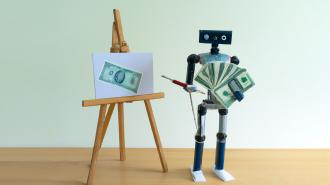Stock photo giant Shutterstock has announced a plan to make AI-generated images available on its website, while also compensating creators whose art helped train the AI.
The controversy: In April 2022, OpenAI — a research lab co-founded by Elon Musk and former Y Combinator president Sam Altman — unveiled DALL-E 2, an AI tool that quickly generates realistic images based on text prompts.
Like most other text-to-image AIs, DALL-E 2 was trained on hundreds of millions of captioned images scraped from the internet. This raises ethical and legal concerns, given that the creators of the original images weren’t compensated or even asked for their consent.
Shutterstock has teamed up with OpenAI to integrate DALL-E into its website.
Not long after DALL-E 2 and other text-to-image AIs became available online, people started trying to sell AI-generated images on Shutterstock, Getty Images, and other stock image websites.
In September, Shutterstock appeared to begin removing some of the images from its catalog, while Getty Images responded by explicitly banning AI-generated art.
What’s new? Shutterstock is now taking a different approach, announcing on October 25 that it had teamed up with OpenAI to integrate DALL-E into its website. Once the integration launches “in the coming months,” customers will be able to submit text prompts to generate new images.
The announcement also noted that Shutterstock had licensed images from its catalog to OpenAI in 2021 to help train DALL-E 2.
The creators of those images seemingly weren’t made aware of the licensing or offered a cut of whatever Shutterstock made from the deal at the time, but they will be getting compensated in the future through Shutterstock’s new “Contributors Fund.”
How it works: The version of DALL-E incorporated into Shutterstock will be trained solely on images licensed on the site, a Shutterstock spokesperson told New Scientist. When Shutterstock sells an image generated by this AI, all of the artists whose images were used to train it will get a cut.
“We want to ensure that the many are protected and compensated.”
Shutterstock Spokesperson
Creators whose images were licensed to OpenAI in 2021 to train DALL-E 2 will be getting a piece of that contract, too, and in both instances, the amount artists receive will be based on how many of their images were included in the training dataset.
“When the work of many contributed to the creation of a single piece of AI-generated content, we want to ensure that the many are protected and compensated (instead of allowing an individual to generate and take full credit for that content),” the spokesperson said.
Looking ahead: Shutterstock says payouts will be made every six months, but it’s not clear what percentage of revenue from the dataset contract or newly licensed AI-generated images will go to creators and how much Shutterstock will keep.
The creators probably shouldn’t expect much of a payout, though, given that it isn’t clear that Shutterstock is legally obligated to pay them anything, but the laws surrounding text-to-image AIs could change, especially when it comes to people’s rights to use AI-generated images commercially.
We’d love to hear from you! If you have a comment about this article or if you have a tip for a future Freethink story, please email us at tips@freethink.com.
